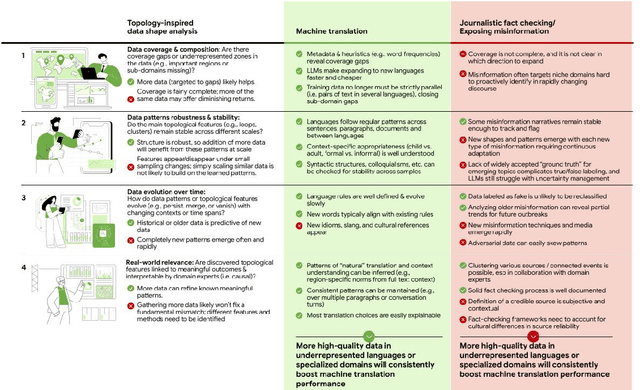Natasha Noy
Dima
Gemma 3 Technical Report
Mar 25, 2025Abstract:We introduce Gemma 3, a multimodal addition to the Gemma family of lightweight open models, ranging in scale from 1 to 27 billion parameters. This version introduces vision understanding abilities, a wider coverage of languages and longer context - at least 128K tokens. We also change the architecture of the model to reduce the KV-cache memory that tends to explode with long context. This is achieved by increasing the ratio of local to global attention layers, and keeping the span on local attention short. The Gemma 3 models are trained with distillation and achieve superior performance to Gemma 2 for both pre-trained and instruction finetuned versions. In particular, our novel post-training recipe significantly improves the math, chat, instruction-following and multilingual abilities, making Gemma3-4B-IT competitive with Gemma2-27B-IT and Gemma3-27B-IT comparable to Gemini-1.5-Pro across benchmarks. We release all our models to the community.
Not Every AI Problem is a Data Problem: We Should Be Intentional About Data Scaling
Jan 23, 2025
Abstract:While Large Language Models require more and more data to train and scale, rather than looking for any data to acquire, we should consider what types of tasks are more likely to benefit from data scaling. We should be intentional in our data acquisition. We argue that the topology of data itself informs which tasks to prioritize in data scaling, and shapes the development of the next generation of compute paradigms for tasks where data scaling is inefficient, or even insufficient.
Relationships are Complicated! An Analysis of Relationships Between Datasets on the Web
Aug 26, 2024Abstract:The Web today has millions of datasets, and the number of datasets continues to grow at a rapid pace. These datasets are not standalone entities; rather, they are intricately connected through complex relationships. Semantic relationships between datasets provide critical insights for research and decision-making processes. In this paper, we study dataset relationships from the perspective of users who discover, use, and share datasets on the Web: what relationships are important for different tasks? What contextual information might users want to know? We first present a comprehensive taxonomy of relationships between datasets on the Web and map these relationships to user tasks performed during dataset discovery. We develop a series of methods to identify these relationships and compare their performance on a large corpus of datasets generated from Web pages with schema.org markup. We demonstrate that machine-learning based methods that use dataset metadata achieve multi-class classification accuracy of 90%. Finally, we highlight gaps in available semantic markup for datasets and discuss how incorporating comprehensive semantics can facilitate the identification of dataset relationships. By providing a comprehensive overview of dataset relationships at scale, this paper sets a benchmark for future research.
DMLR: Data-centric Machine Learning Research -- Past, Present and Future
Nov 21, 2023


Abstract:Drawing from discussions at the inaugural DMLR workshop at ICML 2023 and meetings prior, in this report we outline the relevance of community engagement and infrastructure development for the creation of next-generation public datasets that will advance machine learning science. We chart a path forward as a collective effort to sustain the creation and maintenance of these datasets and methods towards positive scientific, societal and business impact.
 Add to Chrome
Add to Chrome Add to Firefox
Add to Firefox Add to Edge
Add to Edge